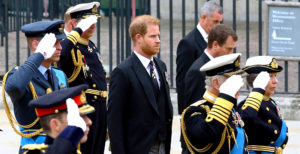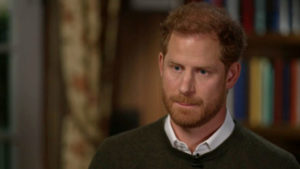Jeremy Clarkson’s savage polemic against Meghan Markle, with its sick fantasy of splattering her naked body with mud, may be of interest to, of all people, philosophers. Philosophers of language talk about “performatives”, meaning bits of language which get something done. Examples would be “I promise to lend you five pounds”, or “I name this overweight old hulk the Jeremy Clarkson”.
Clarkson’s words are performative because they don’t just describe a violent assault; they are one. The ancient Greeks saw a closer relation than we do between verbal and physical aggression: the word “sarcasm” derives from “sarkazein”, a word of theirs meaning to tear the flesh. Verbal onslaughts can be a lot more wounding than physical punch-ups. To adapt the old adage, sticks and stones may break my bones but names will really hurt me.
Although her husband has just published a new memoir, Meghan has always been the focus of the latest moral panic to overtake the British middle classes. These spasms of the national psyche break out from time to time, perhaps according to some secret historical law. The last couple of decades of the 19th century were rife with a loathing of so-called decadence: anarchists, opium dens, sexy French novels, flamboyant aesthetes, most of which could be summarised in two sinister words: Oscar Wilde. (Wilde was also an Irish immigrant, which didn’t help.)
Much of this culture was recycled in the Sixties, though the hair got longer, women could (just about) rebel along with men, and the dope changed from opium to marijuana. Among the targets of the nation’s collective moral wrath were The Rolling Stones, a bunch of innocuous youths who triggered a frenzy of puritan outrage laced with sexual envy. Even The Beatles, goodies to the Stones’s baddies, offended some Americans with their hairstyles. (“What do you call that hairstyle?” a US reporter asked Ringo disdainfully. “Arthur,” he replied.) With the campaigning of Mary Whitehouse, the fear and disgust assumed an organised form, hooking up with the churches and the odd dotty aristocrat. Nowadays, it comes from those who find an orgasmic fulfilment in the roar of a Porsche’s engine.
The characters may differ, but it’s always the same storyline. Traditional values are being corroded by some insidious force. The nation’s fibre is being fatally weakened by (and here you can choose) sex, immigrants, liberal-mindedness, sentimentalism, self-indulgence or excessive sensitivity. Meghan is just a contemporary name for these various forms of pollution. She may be an immigrant from America rather than Albania, arriving in a first-class aircraft cabin rather than a dingy, but the desire to defile her flesh is partly to do with the alien culture she represents, which is not so much the States as California. And California, like Rome, is more of an idea rather than a place.
In the meeting of Harry and Meghan, we could actually see the polluting process in action. In the eyes of traditionalists, an upright young Marine with an impressively high kill-rate, a credit to the British values of loyalty, duty and self-discipline, had been publicly hi-jacked by an ethnically hybrid, touchy-feely starlet who probably consults her astrological chart to decide which colour of tights to wear. It’s hard luck for Clarkson and his kind that this soap-opera star, far from being just one pesky woman, represents a whole shift in social sensibility. It’s increasingly the sensibility of the young, which means that it’s here to stay for quite a while.
With the entry of this American vampire in London into the highest family in the land, woke culture finally penetrated the inmost sanctum of the Establishment and exposed its uglier features. A royal family which ritually praises diversity in the Commonwealth couldn’t handle it on its own doorstep. The battle is now on between American self-expression and British restraint, feeling and convention, wokery and Windsor. In fact, if one wants to be fanciful about it, the American Revolution is being fought out in miniature for a second time. Once again, an America which felt neglected and mistreated by a stiff-necked British Establishment has spurned the Crown and been driven into revolt.
“Woke”, in fact, is a meaningless term — a floating signifier you can stuff with whatever you want. As Zoe Williams wrote in the Guardian: “a hate figure has been created, a shibboleth, a means by which bigots can identify one another and give voice to their prejudice, without fear of censure.” But though woke may be a senseless term, it’s a highly convenient one. Even puce-faced old buffers in Pall Mall clubs are now aware that it isn’t permissible to be openly racist or sexist, so “woke” acts as a useful displacement. You can’t be anti-women, but you can be anti-woke, which means speaking up for good old-fashioned public-school values. Shut up whining, take your punishment like a man, stop picking over your fine feelings and if your head is reeling with confusion stick it under the shower. It’s a philosophy which can be encapsulated in four words — the Duke of Edinburgh — and Meghan is its nemesis. That the Duke’s exit from the royal stage and her entry on to it should have roughly coincided is neatly symbolic.
Meghan has done for her partner what, shamefully, not a single member of his grotesquely dysfunctional family seems to have done: helped him to come to terms with his grief over his mother’s death. That this involved a dash of spookery and psychobabble is neither here nor there. The task clearly couldn’t be left to men whose idea of how to treat newly bereaved children is to wake them up with the news in the middle of the night and then force them to go to church the next morning. More generally, Meghan showed Harry that he was living in an invisible cage, and smuggled in the crowbars by which he could be sprung. He could now see his surroundings through the distancing eyes of a stranger. His partner, to be fanciful once more, is a Henry James-type American heroine who sniffs a whiff of violence and corruption beneath the elegance of old Europe.
The couple escaped, however, to a place which has more in common with their former prison than they might like to think. Both Buckingham Palace and the Californian elite revolve on myths, images and fantasises. Both are places of staggering wealth and privilege which in the form of Hollywood present a facade of harmony and happiness behind which lurk lethal feuds and rivalries. The British monarchy is the longest-running Reality TV show in the world, an upper-class version of Eastenders. The Sussexes have fled from one arena of unreality to another. Both locations are philistine and semi-literate. The difference is that whereas the new world flaunts both its wealth and its feelings, the royal family coyly conceals both. The former is emotionally incontinent, while the latter is emotionally anaesthetised. The royals are public figures with all the reserve of private ones, while Harry and Meghan now belong to a sphere in which the concept of privacy has no place. The social order the prince has left behind believes in sacrificing the self — in duty, honour and obedience — while the world he has embraced is full of extravagant egoism. Neither of them is much engaged with what one might loosely call reality.
There are, then, two stories to be told. The first is that of an enlightened, democratically-minded young woman who causes the scales to fall from the deluded eyes of a moderately Tory ex-soldier. In a rare moment of illumination, he realises that he has spent his life incarcerated in a cockpit of snobbery, racism, deceit and emotional violence, all of it served up in the best possible taste, and breaks with a lifetime’s social conditioning to make a courageous bid for freedom. In the second story, an autocratic young prima donna sinks her claws into a former upper-class yobbo-turned-Marine, and persuades him to desert his duties and family bonds for a shallow, enormously lucrative career as a star of the very media he has previously denounced. Converting themselves overnight from glamorous but dignified figures into commodities on sale in the marketplace, Harry and Meghan vilify those closest to them and whine all the way to the bank about the injustices they have endured at the hands of the Establishment.
There is something to be said for both versions. They don’t, however, weigh equally in the scales, not least if one recalls the vicious abuse Meghan has suffered and Harry’s awakening to the shackles in which he had been living unawares. The couple were surely right to make their escape. Nor is there a contradiction between Harry slagging off his family one minute and asking for reconciliation the next. Telling the truth makes reconciliation hard, maybe impossible; but without the truth it will simply be a sham.
Disclaimer
Some of the posts we share are controversial and we do not necessarily agree with them in the whole extend. Sometimes we agree with the content or part of it but we do not agree with the narration or language. Nevertheless we find them somehow interesting, valuable and/or informative or we share them, because we strongly believe in freedom of speech, free press and journalism. We strongly encourage you to have a critical approach to all the content, do your own research and analysis to build your own opinion.
We would be glad to have your feedback.
Source: UnHerd Read the original article here: https://unherd.com/



